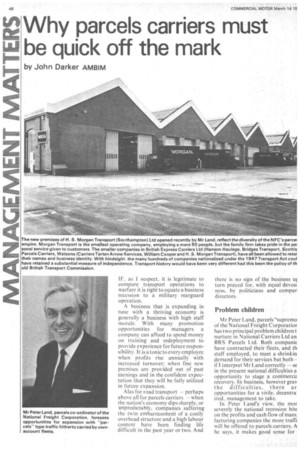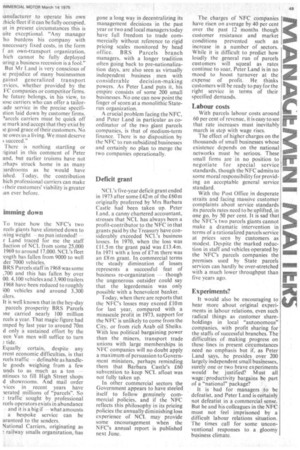Why parcels carriers must be quick off the mark
Page 50

Page 51

If you've noticed an error in this article please click here to report it so we can fix it.
by John Darker AMBIM
IF, as I suspect, it is legitimate to compare transport operations to warfare it is right to equate a business recession to a military rearguard operation.
.A business that is expanding in tune with a thriving economy is generally a business with high staff morale. With many promotion opportunities for managers a company can afford to spend money on training and redeployment to provide experience for future responsibility, It is a tonic to every employee when profits rise annually with increased turnover; when fine new premises are provided out of past earnings and in the confident expectation that they will he fully utilized in future expansion.
Alas for road transport perhaps above all for parcels carriers when the nation's economy dips sharply. or unpredictably, companies suffering the twin embarrassment of a costly overhead structure and a-high labour content have been finding life difficult in the past year or two. And
there is no sign of the business tq turn prayed for, with equal devou n.css, by politicians and compar directors,
Problem children
Mr Peter Land, parcels "supremo of the National Freight Corporatior has two principal problem children t nurture in National Carriers Ltd an BRS Parcels Ltd. Both companic have contracted their fleets, and th staff employed, to meet a shrinkin demand for their services but both
if I interpret Mr Land correctly se in the present national difficulties a opportunity to stage a commerciE• recovery. In business, however gray the difficulties, there ar opportunities for a virile, decentra. ized. management to take,
In Peter Land's view, the mor severely the national recession bite on the profits and cash flow of rnant. facturing companies the more traffi will be offered to parcels carriers. A he says, it makes good sense for
ianufacturer to operate his own :hicle fleet if it can be fully occupied, ut in present circumstances this is uite exceptional. "Any manager ho burdens his company with nnecessarY fixed costs, in the form I an own-transport organization, hich cannot be fully deployed uring a business recession is a fool." But Mr Land is very conscious of te prejudice of many businessmen gainst generalized transport xvices, whether provided by the FC companies or competitor firms. he future belongs, in his view, to iose carriers who can offer a tailorlade service in the precise specifittion laid down by customer firms. 3arcels carriers must be quick off le mark and accept that they exist by le good grace of their customers. No ne owes us a living. We must deserve ) succeed."
There is nothing startling or riginal in this comment of Peter and, but earlier truisms have not :rhaps struck home in as many Da rdrooms as he would have ished. Today, the contribution hich professional carriers can make their customers' viability is greater an ever before.
imming down
To trace how the NFC's two reels giants have slimmed down to .xing weight no pun intended! — r Land traced for me the staff Juction of NCL from some 25,000 1969 to around 17,000. NCL's fleet .ength has fallen from 9000 to well ,der 7000 vehicles.
BRS Parcels staff in 1968 was some ,700 and this has fallen by over 00. 4,100 vehicles and 3,900 trailers 1968 have been reduced to roughly ;00 vehicles and around 3,300 ilcrs
It is well known that in the hey-day parcels prosperity BRS Parcels )ne carried nearly 100 million reels a year. That magic figure had [rived by last year to around 70m d only a sustained effort by the .een Van men will suffice to turn tide.
Equally certain, despite any rrent economic difficulties, is that
reels traffic definable as handlele goods weighing from a few unds to as much as a ton — ntinues to fill High Street shops d showrooms. And mail order .viccs in recent years have nerated millions of "parcels". So
traffic sought by professional reels operators exists in abundance and it is a big if what amounts a bespoke service can be aranteed to the senders.
National Carriers, originating as railway smalls organization,,has
gone a long way in decentralizing its management decisions in the past year or two and local managers today have full freedom to trade commercially without reference to rigid pricing scales monitored by head office. BRS Parcels branch managers, with a longer tradition often going back to pre-nationalization days, are also seen as virtually independent business men with considerable decision-making powers. As Peter Land puts it, his empire consists of some 200 small businesses. No one can now point the finger of scorn at a monolithic Staterun organization.
A crucial problem facing the NFC, and Peter Land in particular as coordinator of the two giant parcels companies, is that of medium-term finance. There is no disposition by the NFC to run subsidized businesses and certainly no plan to merge the two companies operationally.
Deficit grant
NCL's five-year deficit grant ended in 1973 after some £42 m of the £60 m originally proferred by Mrs Barbara Castle had been taken up. Peter Land, a canny chartered accountant, stresses that NCL has always been a profit-contributor to the NFC in that grants paid by the Treasury have considerably exceeded NCL's business losses. In 1970, when the loss was £11.5 m the grant paid was £13.4 m. In 1971 with a loss of £7 m there was an £8m grant. In commercial terms the steady diminution of losses represents a successful feat of business re-organization — though the ungenerous outsider could say that the legerdemain was only possible with a benevolent banker. Today, when there are reports that the NFC's losses may exceed £10 m for last year, compared with a miniscule Profit in 1973, support for the NFC is unlikely to come from the City, or from rich Arab oil Sheiks. With less political bargaining power than the miners, transport trade unions with large memberships in NFC companies will no doubt apply a maximum of persuasion to Government ministers, perhaps reminding them that Barbara Castle's £60 subvention to keep NCL afloat was not fully taken up.
In other commercial sectors the Government appears to have steeled itself to follow genuinely commercial policies, and if the NFC reflects this philosophy in its pricing policies the annually diminishing loss experience of NCL may provide some encouragement when the NFC's annual report is published next June. The charges of NFC companies have risen on average by 40 per cent over the past 12 months though customer resistance and market conditions prevented such an increase in a number of sectors. While it is difficult to predict how loudly the general run of parcels customers will squeal as rates continue to soar, Peter Land is in no mood to boost turnover at the .expense of profit. He thinks customers will be ready to pay for the right service in terms of their specified demands.
Labour costs
With parcels labour costs around 60 per cent of revenue, it is easy to see that rate increases must inevitably march in step with wage rises.
The effect of higher charges on the thousands of small businesses whose existence depends on the national networks must be serious. These small firms are in no position to negotiate for special service standards, though the NFC admits to some moral responsibility for providing an acceptable general service standard.
With the Post Office in desperate straits and facing massive customer complaints about service standards its parcels rates need to be uplifted, in one go, by 50 per cent. It is sad that the NFC's two parcels giants cannot make a dramatic intervention in terms of a rationalized parcels service at prices seen by customers as modest. Despite the marked reduction in staff and vehicles operated by the NFC's parcels companies the premises used by State parcels services can hardly be over-stretched with a much lower throughput than five years ago.
Experiments?
It would also be encouraging to hear more about original experiments in labour relations, even such radical things as customer shareholdings in local "autonomous" companies, with profit sharing for the staffs of successful branches. The difficulties of making progress on these lines in present circumstances need no emphasis but if, as Peter Land says, he presides over 200 largely independent small businesses, surely one or two brave experiments would be justified? Must all wage/ productivity bargains be part of a "national" package?
It is bad for managers to be defeatist, and Peter Land is certainly not defeatist in a commercial sense. But he and his colleagues in the NFC must not feel imprisoned by a difficult labour relations situation. The times call for some unconventional responses to a gloomy business climate.








































































































